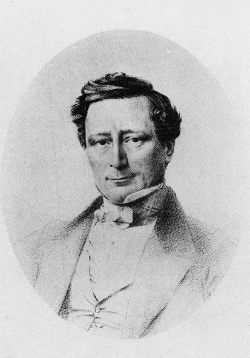'The largest employer in the world'
In Victorian times Samuel Morton Peto was a generous Baptist with a varied career that included building Nelson’s Column, rebuilding the Houses of Parliament, constructing railways across the UK and Europe and becoming an MP aged 38. Extremely considerate to his vast workforce, his is a name almost unknown today - which is why Douglas Sparkes has written a biography, published by the Baptist Historical Society
It is a name almost unknown today, but in the 19th century Samuel Morton Peto was quite a celebrity, especially in Baptist circles. Though there were failings on Peto’s part, he did much good, and his story deserves to be better known.

Peto was the son of a tenant farmer in Surrey, who, in due time, pursued three careers. First he was apprenticed to Uncle Henry, a well-to-do London-based building contractor. When Henry unexpectedly died he bequeathed his business to Peto and his cousin, Thomas Grissell. They expanded the business, taking contracts for many public works, including, in London, the creation of Trafalgar Square, the erection of Nelson’s Column and nearby, the rebuilding of the Houses of Parliament after its disastrous fire of 1834.
These were the years in which railways were coming to birth and Peto, separating amicably from his cousin, entered the lists of railway builders. The rewards were great, and Peto became very wealthy, but the risks were equally enormous and Peto suffered as did so many others. He laid down many lines in England, and when contracts began to dry up he turned his attention to other countries, building railways in Norway, Denmark, Canada, France, Australia, Algeria, Russia and Argentina.
His parents had been Anglicans, and during his earlier years he had married Mary, the sister of Thomas Grissell, but after a period of failing health, she died when she was only 35 years. Soon Peto married again, this time Sarah Kelsall of Rochdale. Her family, and she herself, were committed and involved Baptists. For a short time Peto had lived in Norwich and had attended St Mary’s there, where he got to know as a friend, the minister, William Brock, whose ministry he thoroughly appreciated. New wife and minister brought Peto more fully into Baptist circles, though throughout his life he cultivated warm sentiments to all other Christian traditions.
He became very supportive of the Baptist Missionary Society and served as Treasurer 1845-1867, and gave generously to its work. He was generous, too, to many churches and himself funded the building of Bloomsbury Baptist Church, and brought to it its first minister, his friend, William Brock. He assisted the Stepney Baptist College in its move to premises in Regents Park. He gave freely to many charities, of his time as well as his wealth.
Peto was also very considerate to his work force. Some claimed he employed the largest work force in the world. He believed that all employers should act honourably towards their men, and for his own part he insisted all who were on his payroll should be paid every week in cash. He also provided funds for sickness benefit and small grants to dependents of former employees. He had portable huts made as sleeping accommodation for the navvies who formed the greater part of his work force.
Near the time of his second marriage he purchased the estate of Somerleyton Hall near Lowestoft and while spending a fortune on restyling the main house as a family home, rebuilt cottages on the estate for the workers there. He introduced many improvements to the nearby town of Lowestoft, linking it and Great Yarmouth by rail with Norwich and London.
In the General Election of 1847 he entered upon his third career, being chosen as Member of Parliament for Norwich. In 1852 he retained his seat but his second term lasted less than 18 months because he had offered, with others, to build a railway in the Crimea to carry the needs of soldiers more dependably over difficult land, and so became, technically, a government employee. For the work he did, at cost, he was created a Baronet by Queen Victoria. In 1859 he was back in the Commons as Member for Finsbury. In the House Peto spoke on many issues but especially on concerns of the churches, particularly Nonconformists. Whilst serving as a Member of Parliament he was still working as a railway contractor.
In 1866 the bank of Overend and Gurney, financing Peto’s contracts, had to declare itself unable to continue to trade, and around two hundred other firms were made bankrupt, of which Peto’s was by far the largest. In spite of the optimism of himself and his friends, Peto soon found he had to pay the penalty. He contested matters in the courts but in the end alongside the culpability of the bank, he, too, was found guilty and his bankruptcy confirmed. Thereafter, apart from an insignificant line in Cornwall, Peto laid down no more lines. He died in 1889.
Hitting the Buffers, Samuel Morton Peto 1809-1889, Railway Builder Extraordinaire has been published by the Baptist Historical Society as a 200 + xiv pp. paperback with 25 illustrations and a map. It is available at £18, incl of p&p (£22 after 28 February) from the Revd S Langford, 6, Tracy Close, Whitchurch, Bristol BS14 0SP
Picture: Wikimedia Commons
Baptist Times, 09/12/2013